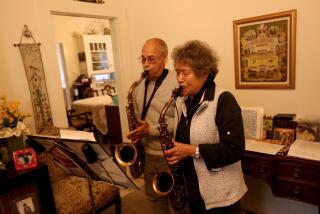When a Voice Inside Says ‘Change,’ It’s a Good Idea to Pay Attention
- Share via
I have been a lame duck teacher this year. I retired from UC Irvine last July, but I agreed to hang in part time for another year while my department searched for a replacement. I am teaching my last class this quarter, and it has underscored a lesson that I had already learned. And learned. And apparently have to keep learning: that when a particular activity has run its course in your life, when your psyche is set for change, you must obey those rhythms and not string them out.
We learn very young to resist change--or, perhaps more accurately, we feel that resistance instinctively. A child reasons very simply on this point. The familiar, even when it isn’t so hot, is comfortable. The unknown, even though it may offer great promise, is fearsome. Therefore, on balance, children will almost always opt against change. And far too often--and for the same reasons--older people will do the same thing, even though we spend a lot of middle-adult years trying to unlearn that process in order to open up new challenges and opportunities.
It isn’t an easy lesson to learn. Yet, when you simply flat out close yourself to change, you are frequently in conflict with the normal rhythms of life, stiff-arming them resolutely as they try--gently, at first--to point you in new directions.
I feel a little bit sorry for my students this year because their instructor’s head has moved beyond the classroom and has to be wrenched back firmly each teaching day. I told myself, of course, that that wouldn’t happen, but I should have known better.
As a result, I find myself impatient and short--and sometimes drifting--in the classroom, and my eyes glaze over when I sit down with student papers. It takes me ridiculous amounts of time to read and comment on them, and I frequently find myself resenting the whole process.
Why should I have known that would happen? Because every time in my life I have ignored those rhythms, I have paid in precisely the same way. Yet, even understanding this, it is still hard to know the difference between change that may be frivolous, or at least temporal, and change that must be dealt with in very direct and honest ways.
When my children were growing up in Orange County, we spent our summers in rural Indiana. For more than 10 years, we rented out our Corona del Mar home and took off for a Midwestern lake cottage as soon as school was out. I think all of my children look back on those years with real warmth. I know I do.
But then changes began to take place. As the children grew older, they got involved in other things at home, and one by one, they began to defect from our Indiana summers. Finally, the youngest--immersed in her senior year in high school and the summer activities that preceded it--begged off. She stayed with friends while my wife and I made the Indiana pilgrimage. That was mostly my doing. I simply couldn’t let go.
We spent two summers there without children--actually we borrowed children one summer--and it didn’t work. I was pushing a good thing, a warm and wonderful thing, beyond its limits. It had been time to accept the rhythms of change two years earlier, and when I refused to do that, I paid the price of eroding the edges of beautiful memories unnecessarily.
I have beautiful memories of teaching, too. There is enormous satisfaction in hearing from young people--as I do frequently--who are making it professionally, at least in small part because of what they took away from my classroom. And in the lifetime friendships that have grown from that place.
I don’t want to cloud those memories by overstaying my time. Nor do I want to fight against the rhythms of life in other ways in the years ahead of me out of either fear or a smothering need for security.
There can still be some surprises left. I don’t want to miss them.






